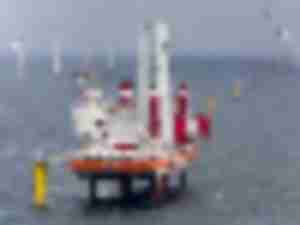U.S. says nearly 50,000 new jobs could be created by offshore wind by 2030
The National Renewable Energy Laboratory (NREL) released a report on January 23rd stating that the U.S. goal of generating 30 Gigawatts (GW) of offshore wind power by 2030 will create nearly 50,000 new American jobs, provided that major upgrades in ports and shipyards are achieved.
‘Don’t bet against LA’ says Port of LA’s Seroka
In spite of the loss of cargo to East and Gulf coast ports and the continued stalemate in dockworker contract negotiations between the International Longshore and Warehouse Union (ILWU) and the Pacific Maritime Association (PMA), Port of Los Angeles Executive Director Gene Seroka is convinced his port will bounce back stating: “Don’t bet against LA.”
Jensen says container trade recovery could be delayed until 2024
The hopeful projections for recovery in cargo volumes in 2023 may be overshadowed by the more pessimistic projection of delayed recovery which may only manifest itself in 2024, according to Lars Jensen, Principal at Vespucci Maritime based in Copenhagen, Denmark.
Biden Administration Decarbonization Blueprint targets transportation
The document is a collaboration of the U.S. Departments of Energy, Transportation, Housing and Urban Development, and the Environmental Protection Agency (EPA).
Accelerating into 2023
Reflecting on 2022, after two and half years of disruption, the transportation and supply chain sector is at a moment to differentiate how we do business and leverage technology to accelerate the industry. Looking ahead to 2023, the opportunity lies before us to deepen strategic relationships with customers and to deliver value.
Port of Los Angeles & Long Beach see further cargo declines and blank sailings
In his media briefing on December 14th, Gene Seroka executive director Port of Los Angeles reported that November cargo volumes at the Port of Los Angeles declined to 639,344 TEUs in November 2022 compared to 811,460 TEUs in November 2021.
Port of South Louisiana sees growth in 2022 despite low water on the Mississippi
The Port of South Louisiana reports an 8% increase in tonnage for the first three quarters of 2022 despite low water problems on the Mississippi that have slowed some tug and barge traffic. Micah Cormier, Director of Communications, Port of South Louisiana, told AJOT that agricultural exports increased in 2022 for the first three quarters and cited the following:
Biden Administration announces winners of California offshore wind energy auction
The first offshore wind lease sale in the Pacific results in over $757 million in winning bids for five lease areas, which have the potential to power over 1.5 million homes, according to the U.S. Department of Energy.
Using Transportation Invoice Data to Reduce Carbon Emissions
Empowering transportation business leaders to see the detailed actual emissions coming from each shipment, based on vehicle, lane and mode
How warehouse solutions can help navigate 7 disruptive supply chain trends entering 2023
Even though it might not always seem like it, things are getting better across global industry supply chains that have been impacted since the pandemic. As shipping ports are easing up, companies are proactively investing in new technologies and building contingency plans in hopes of making their supply chains more resilient and agile.
© Copyright 1999–2025 American Journal of Transportation. All Rights Reserved











